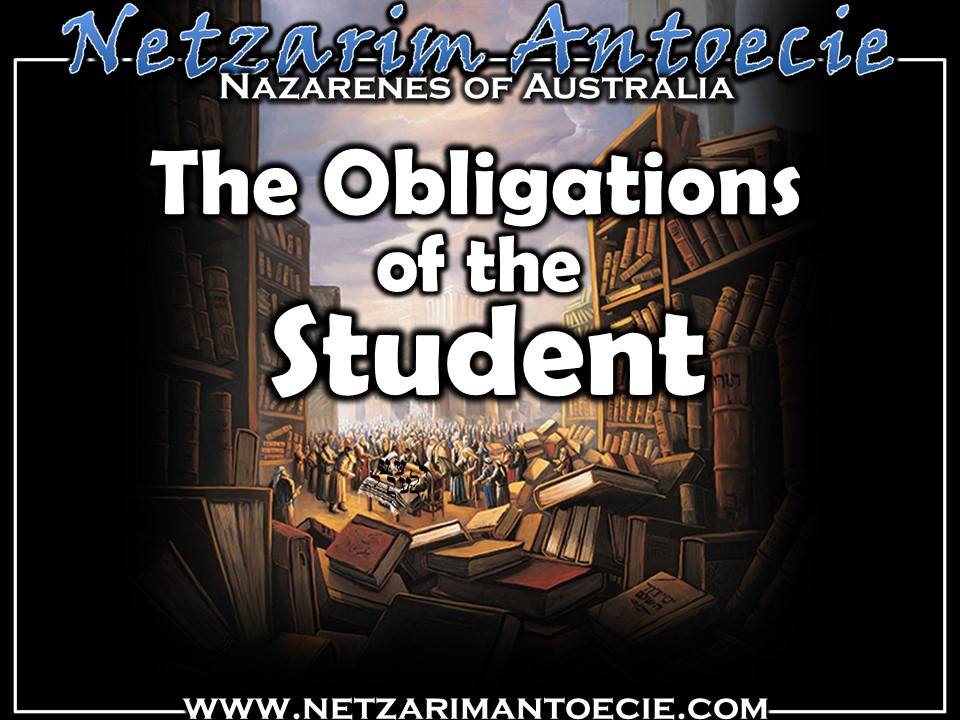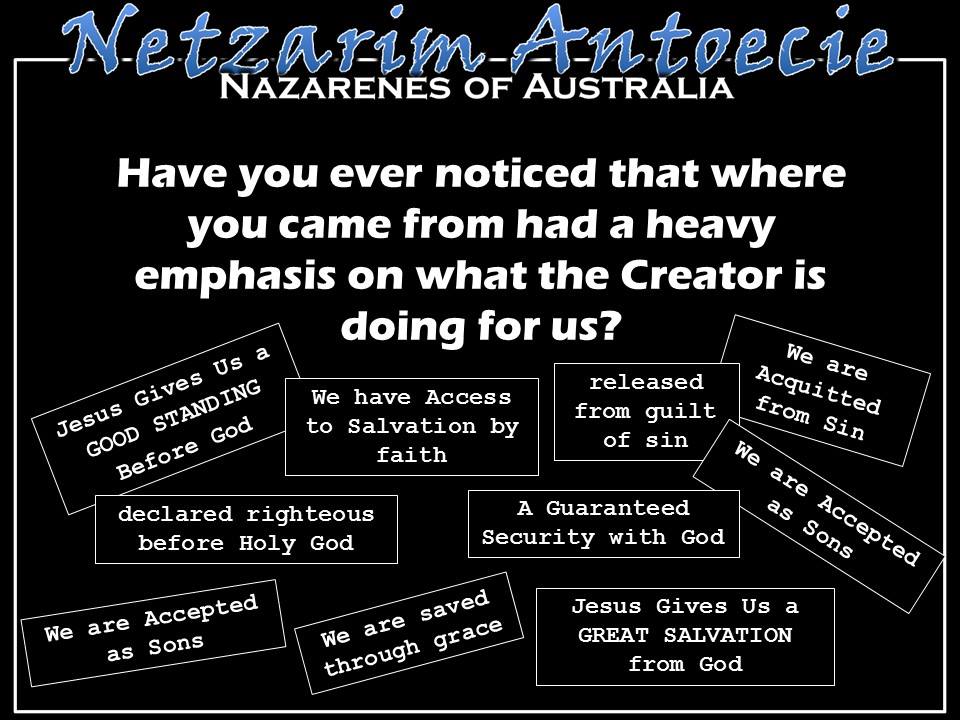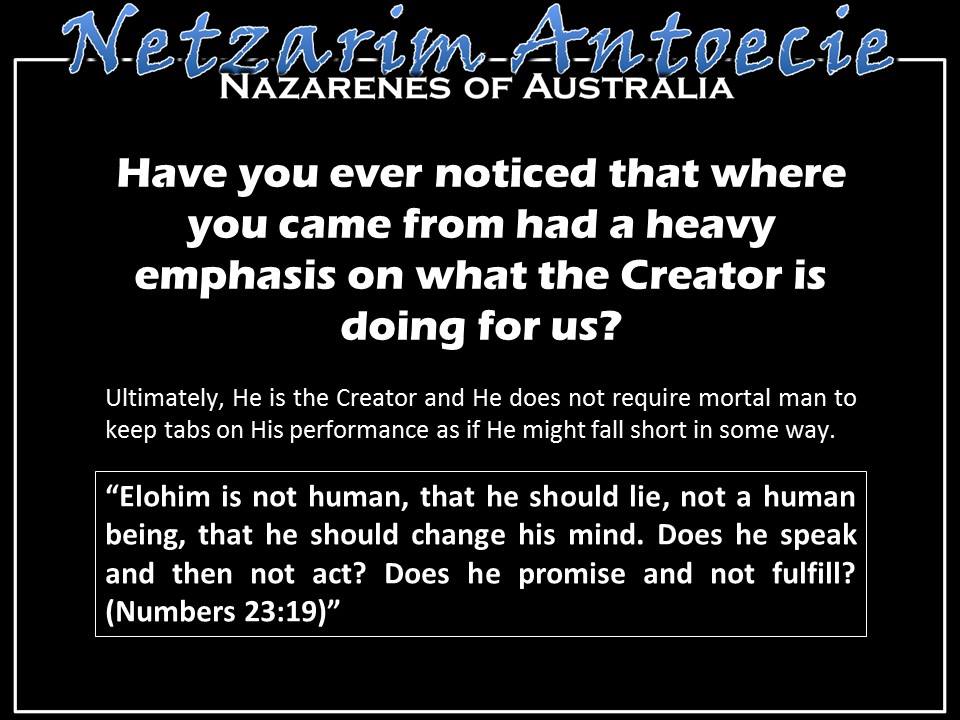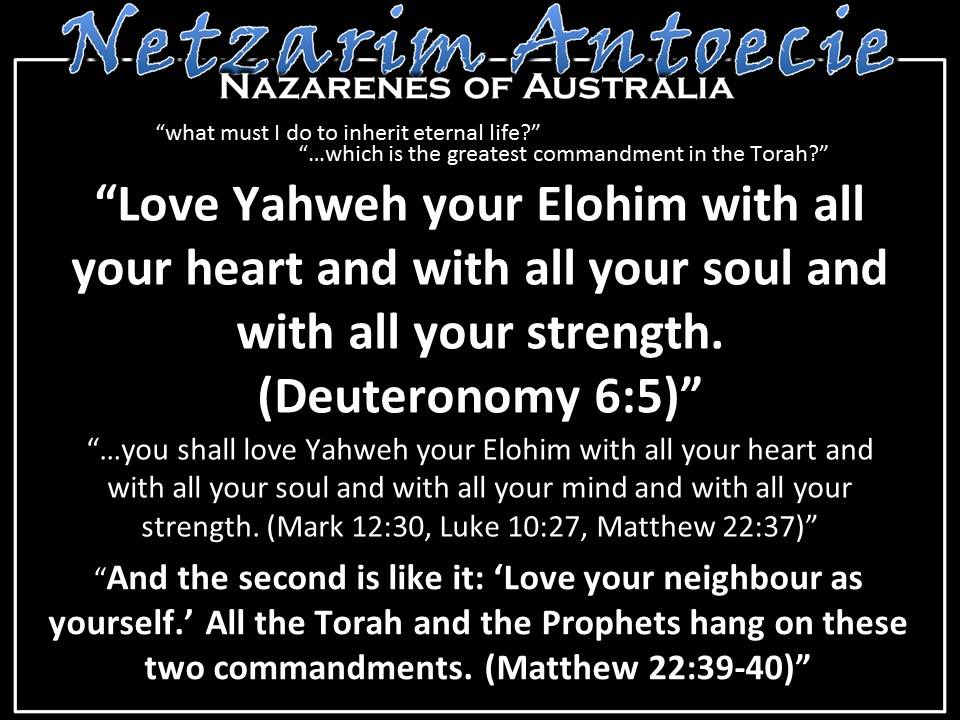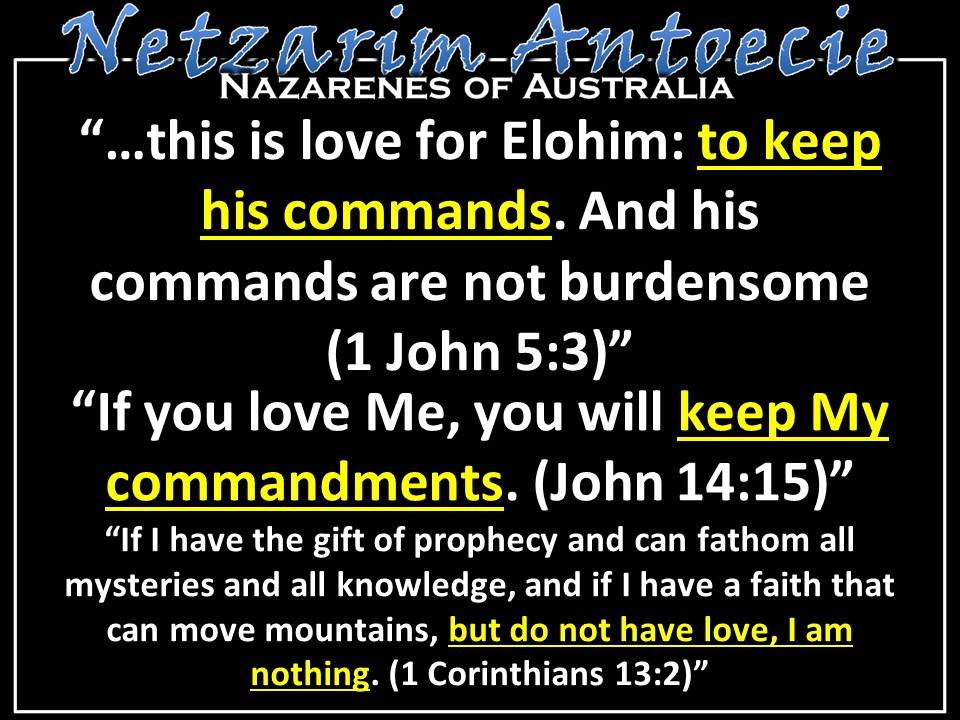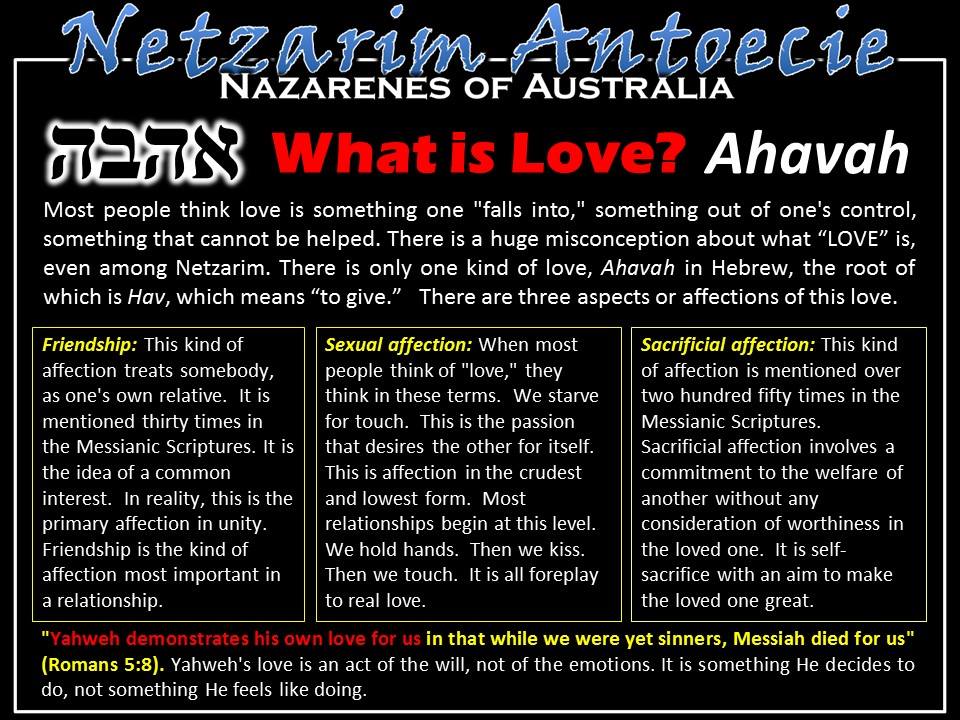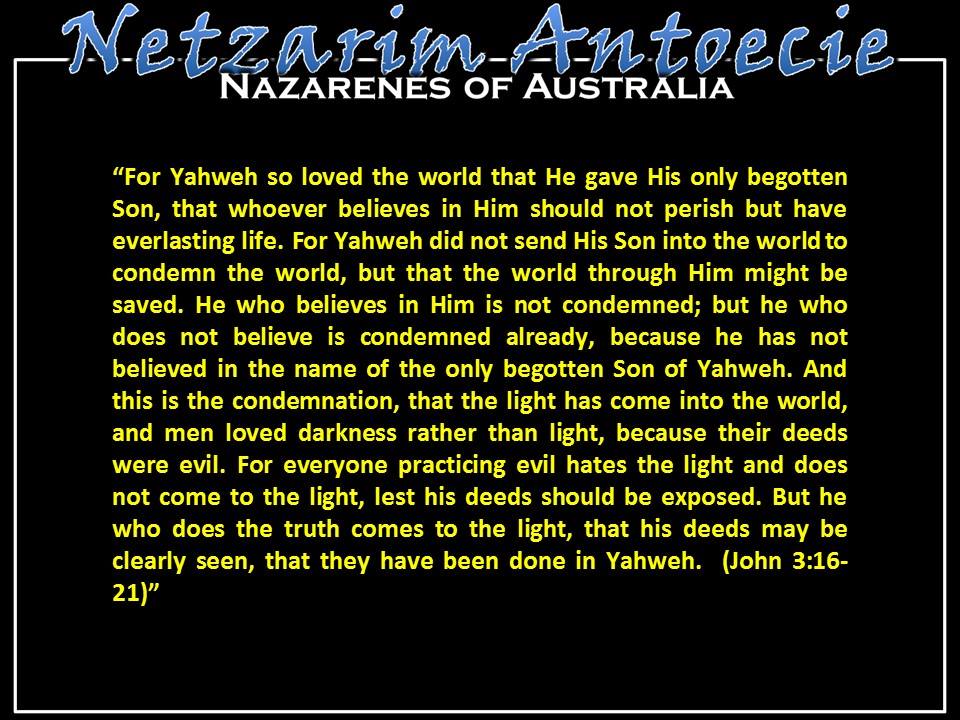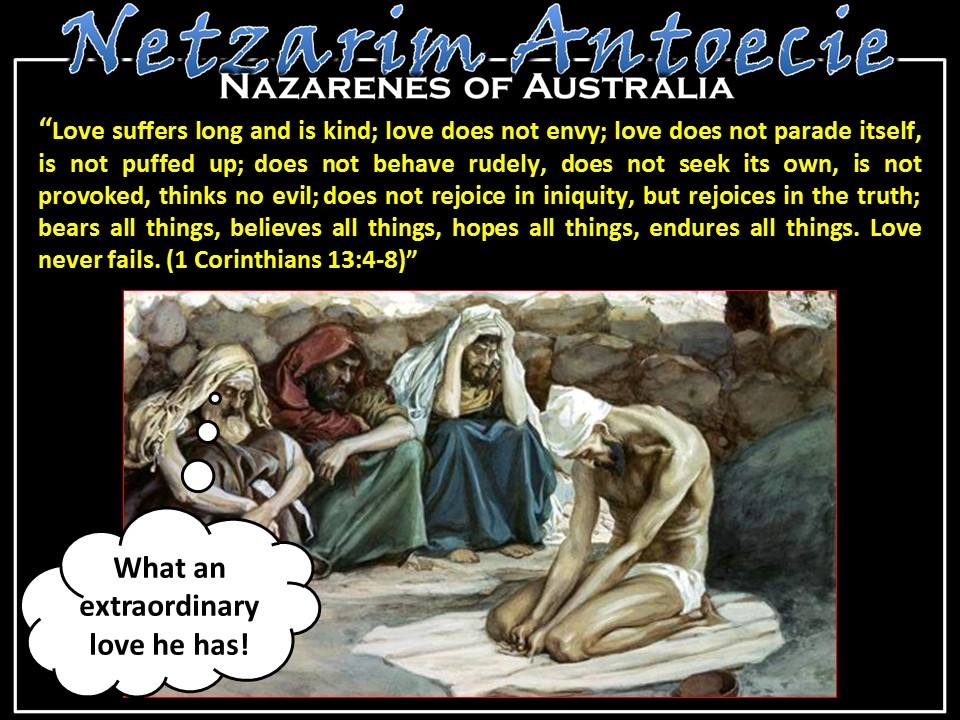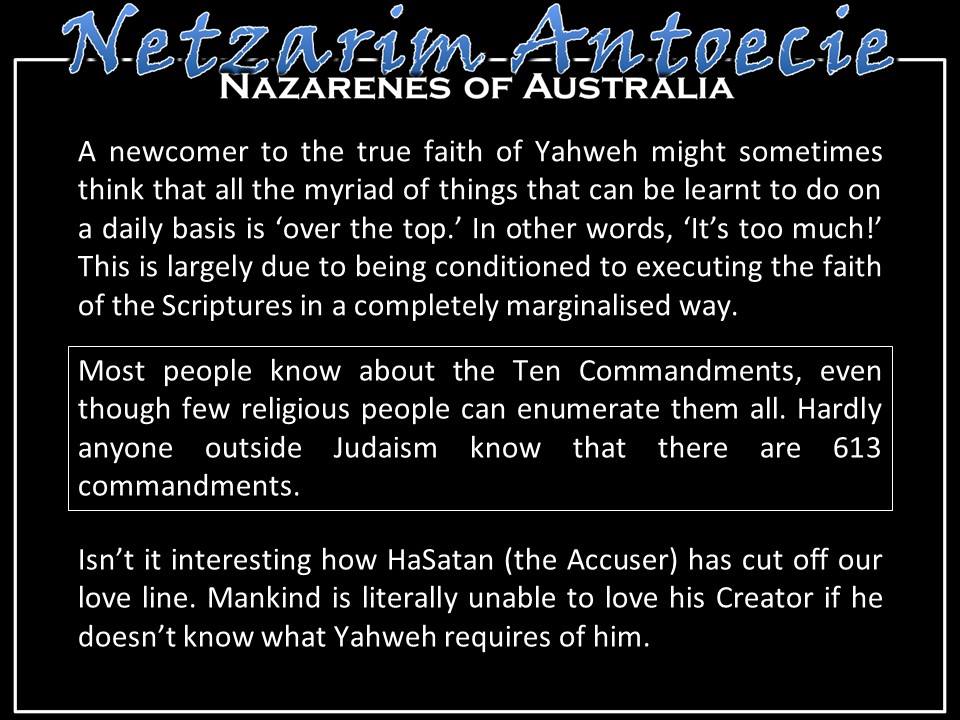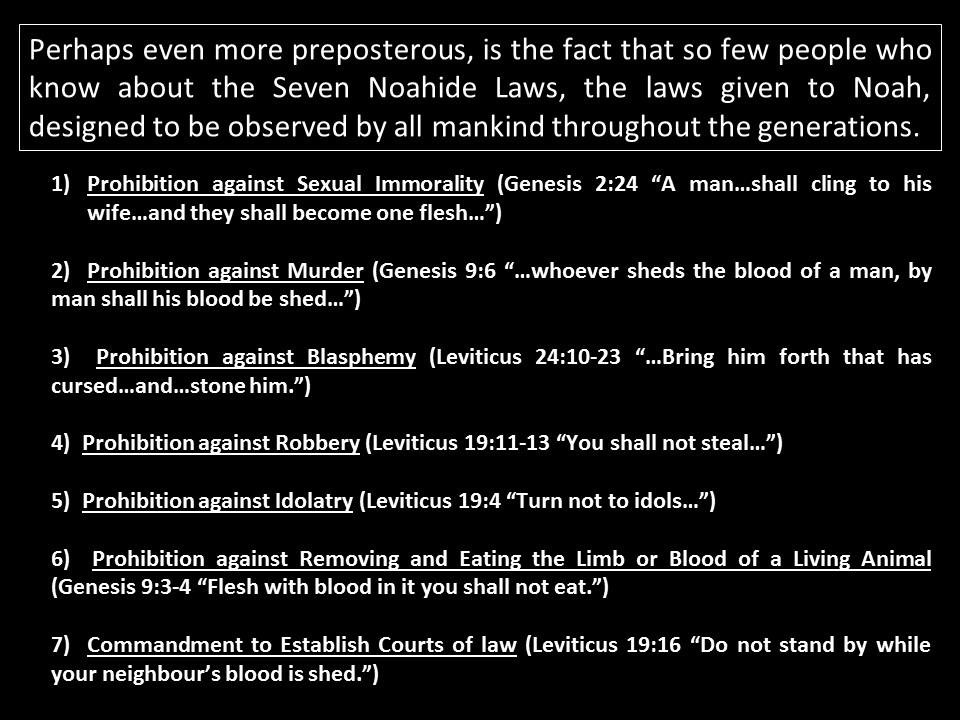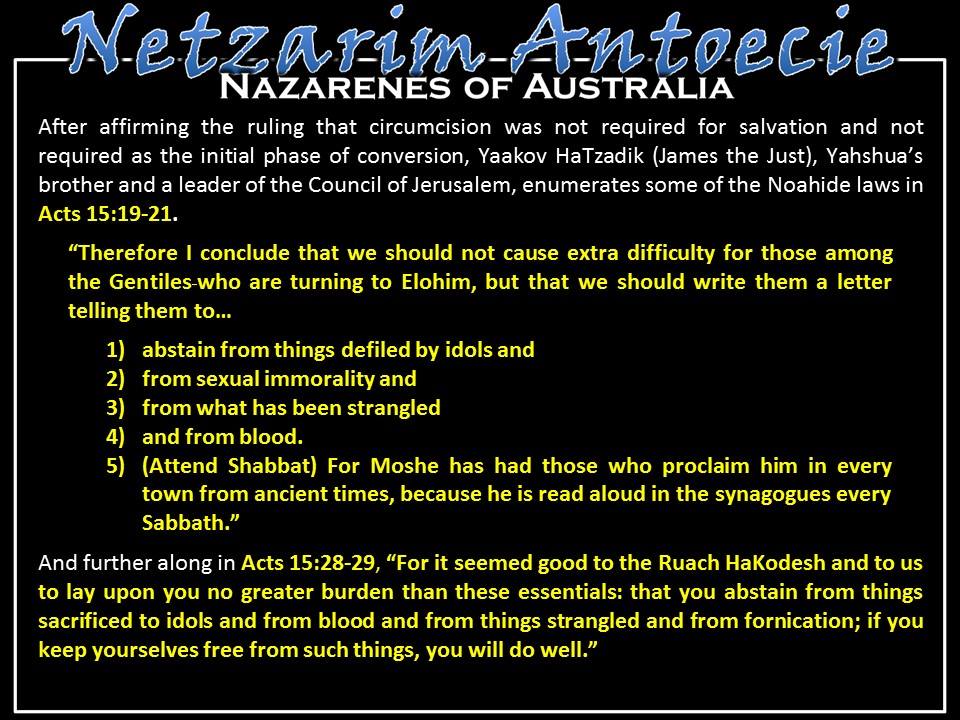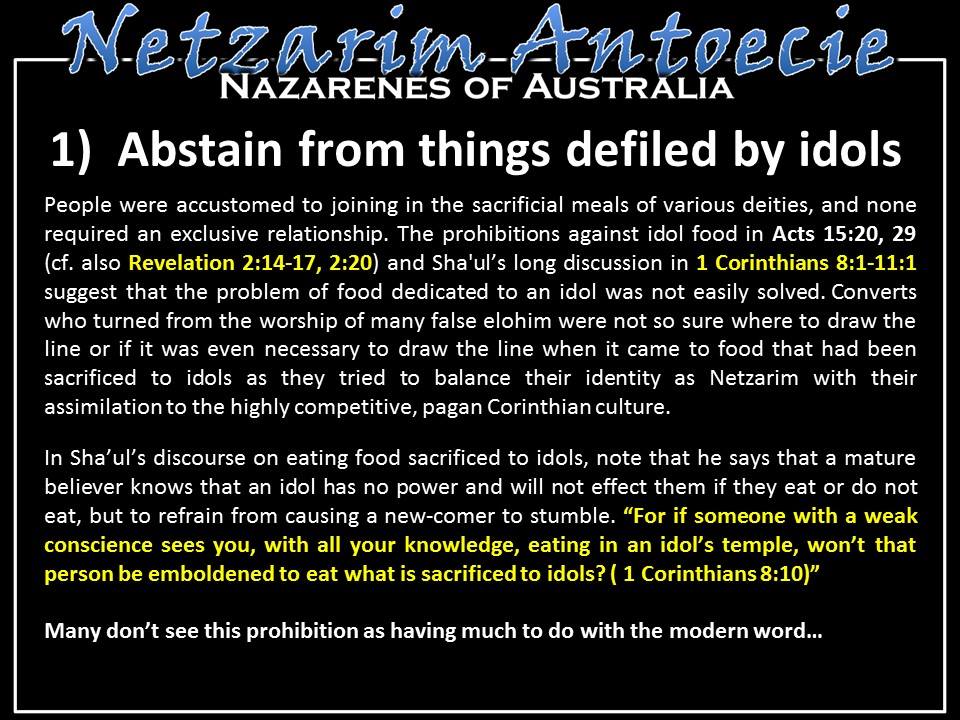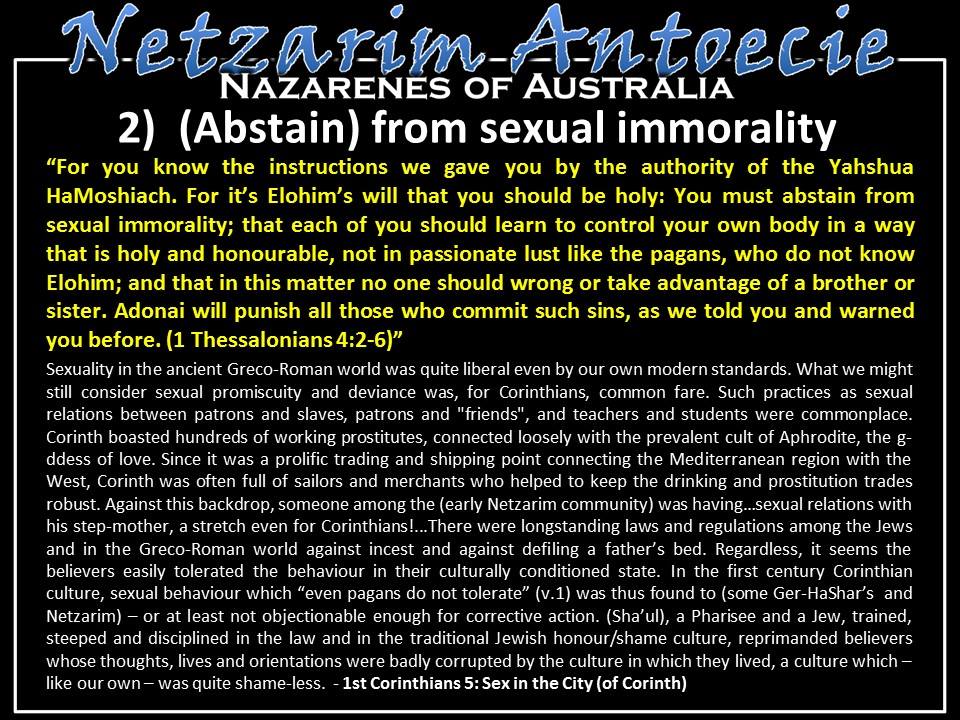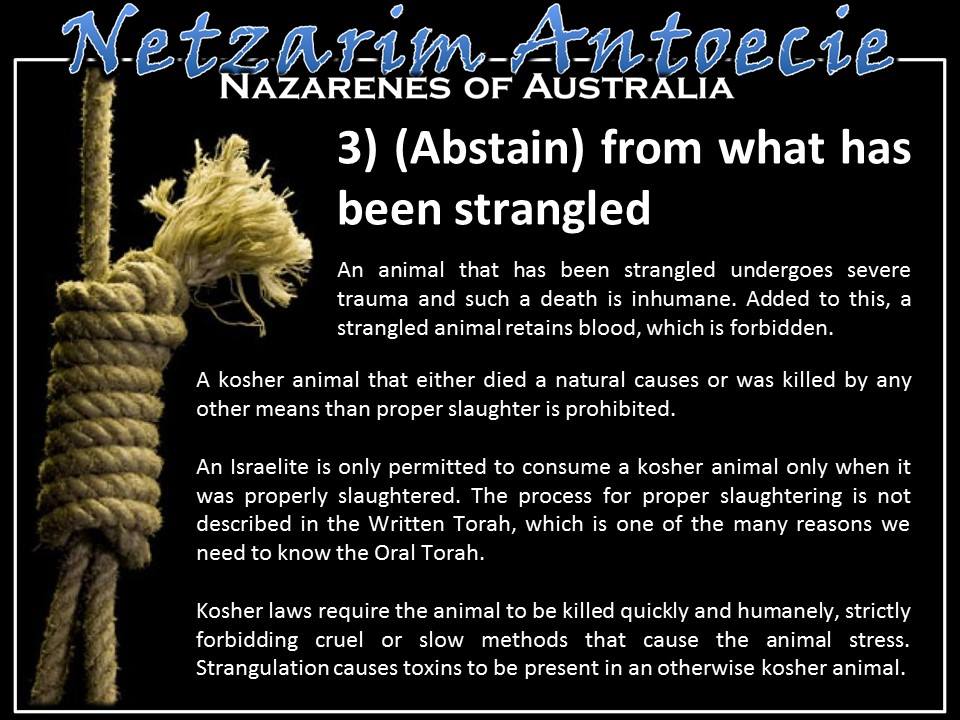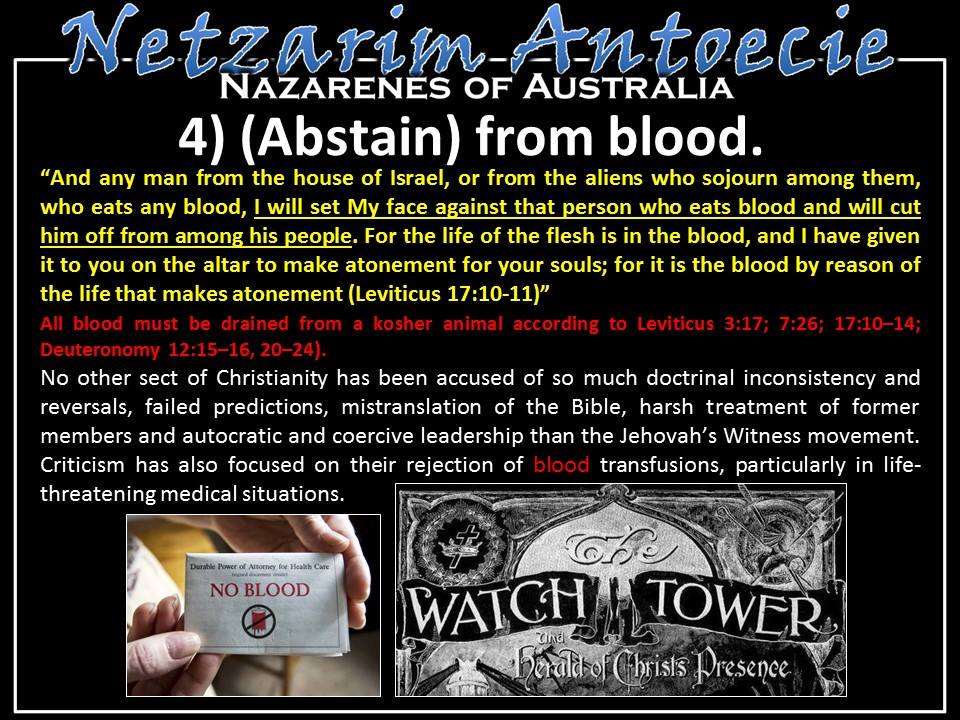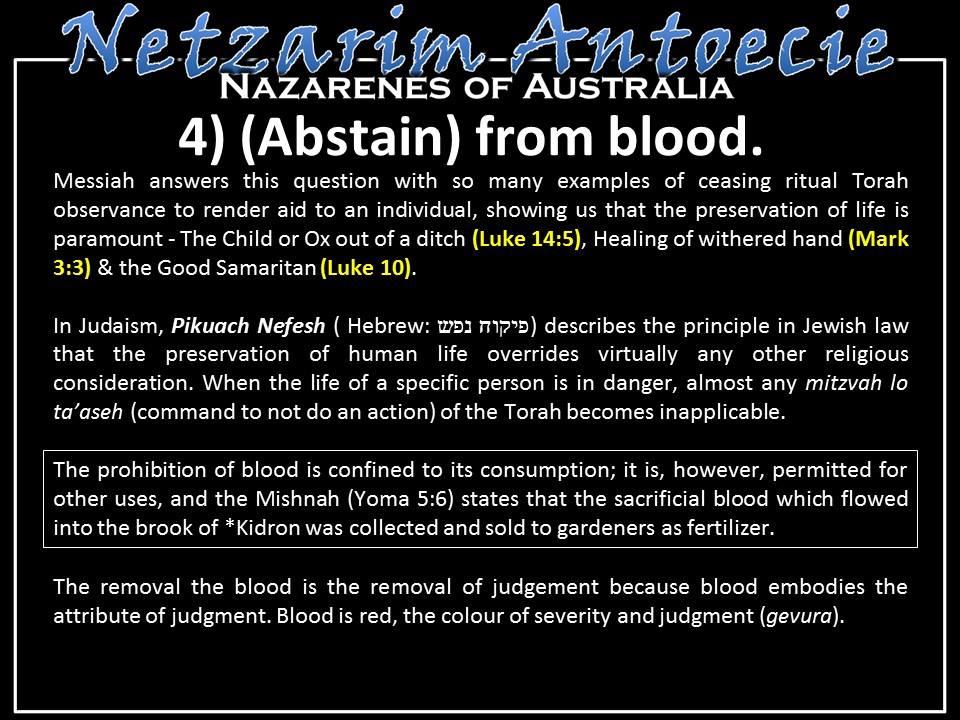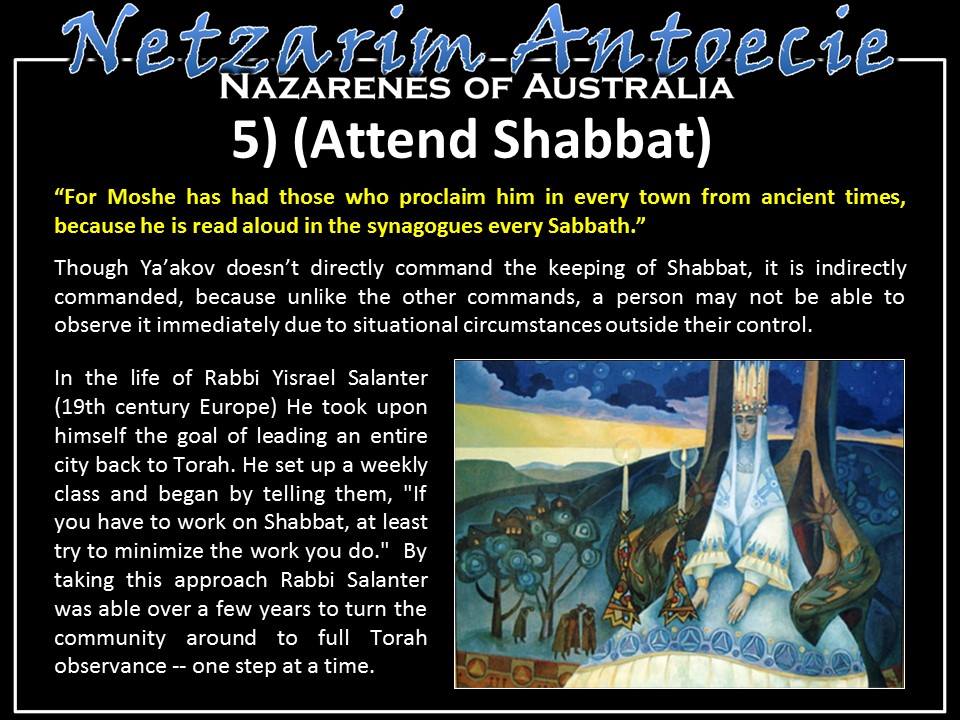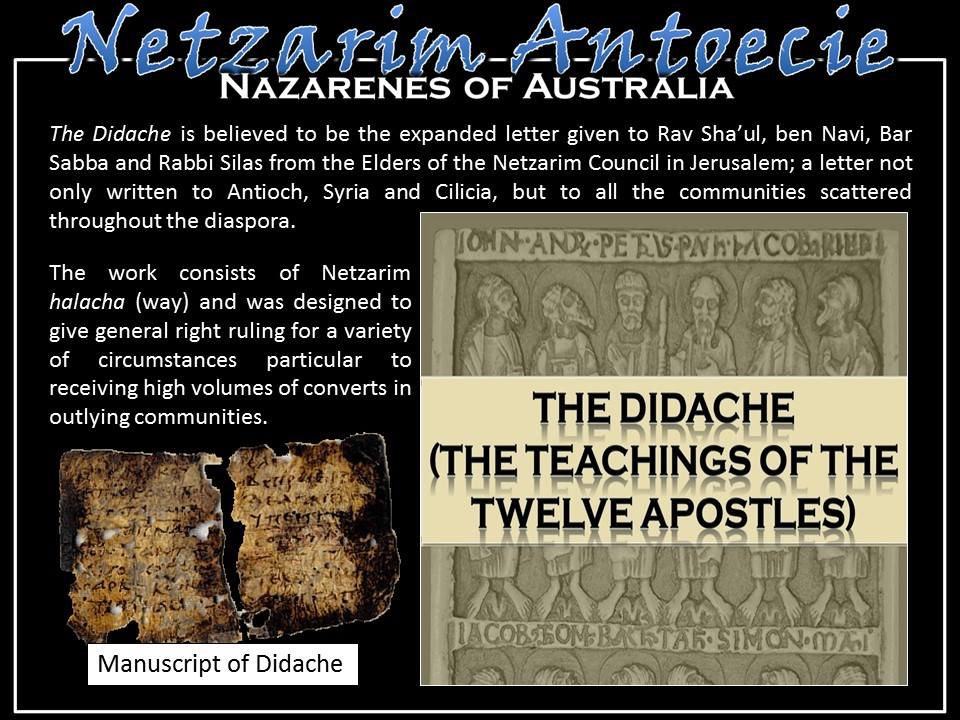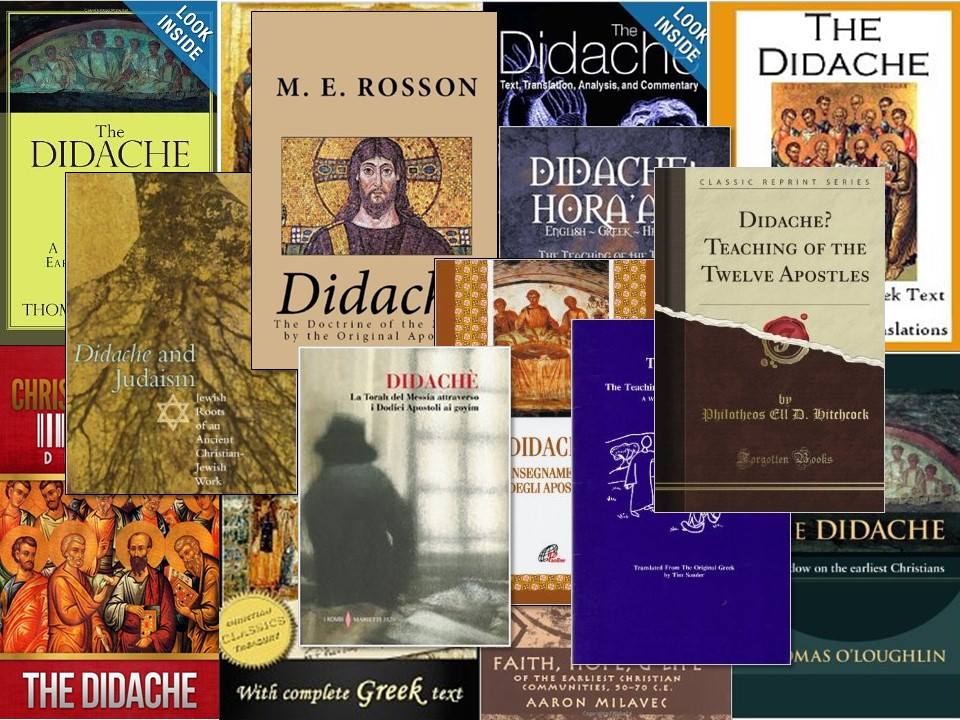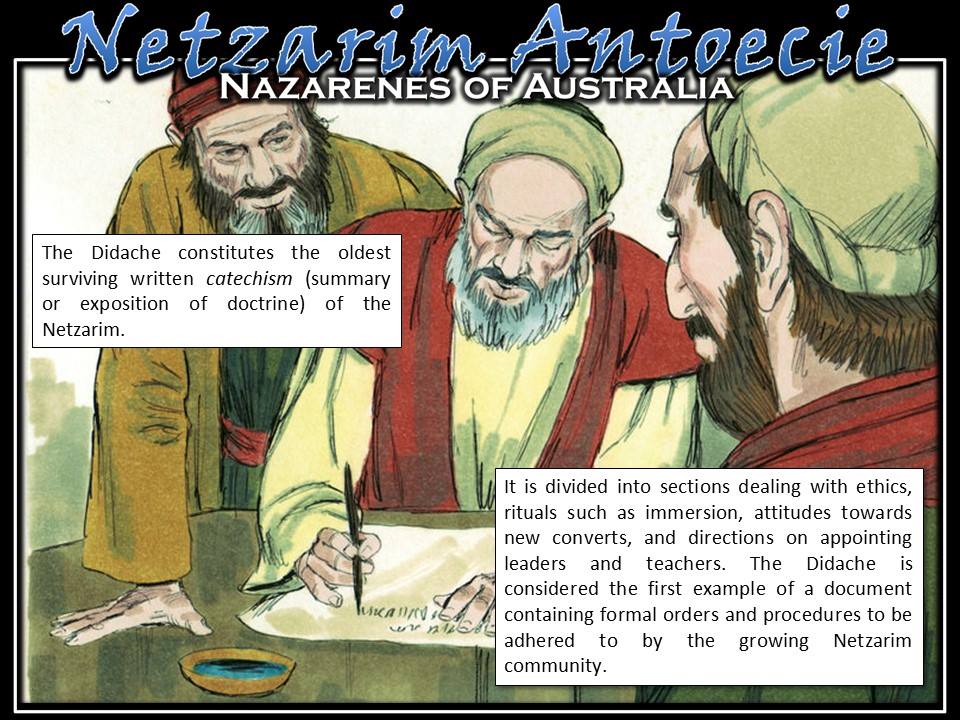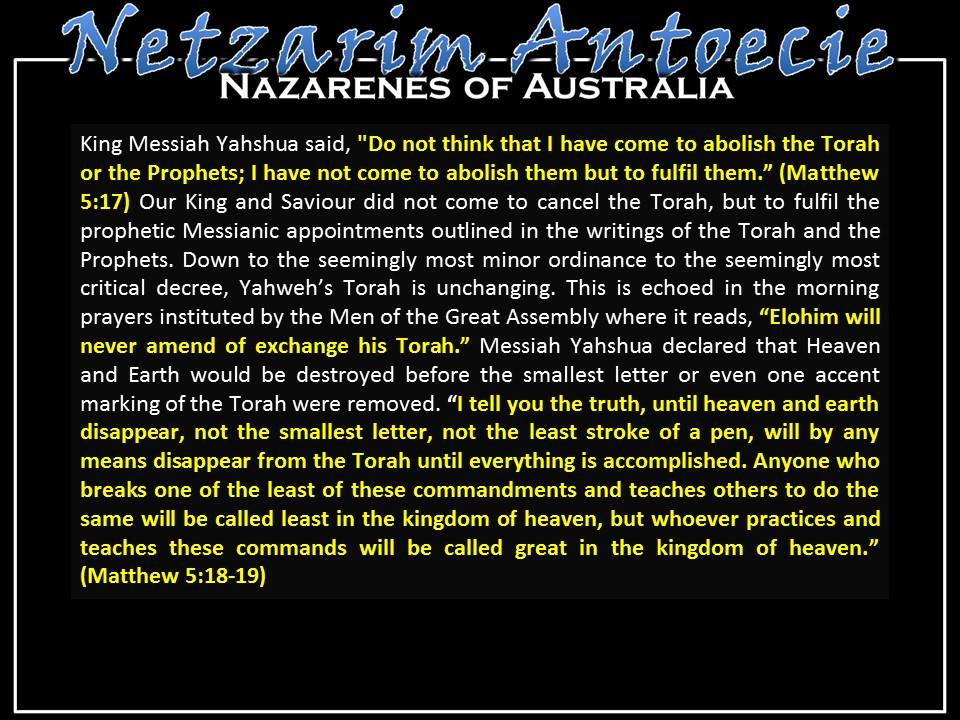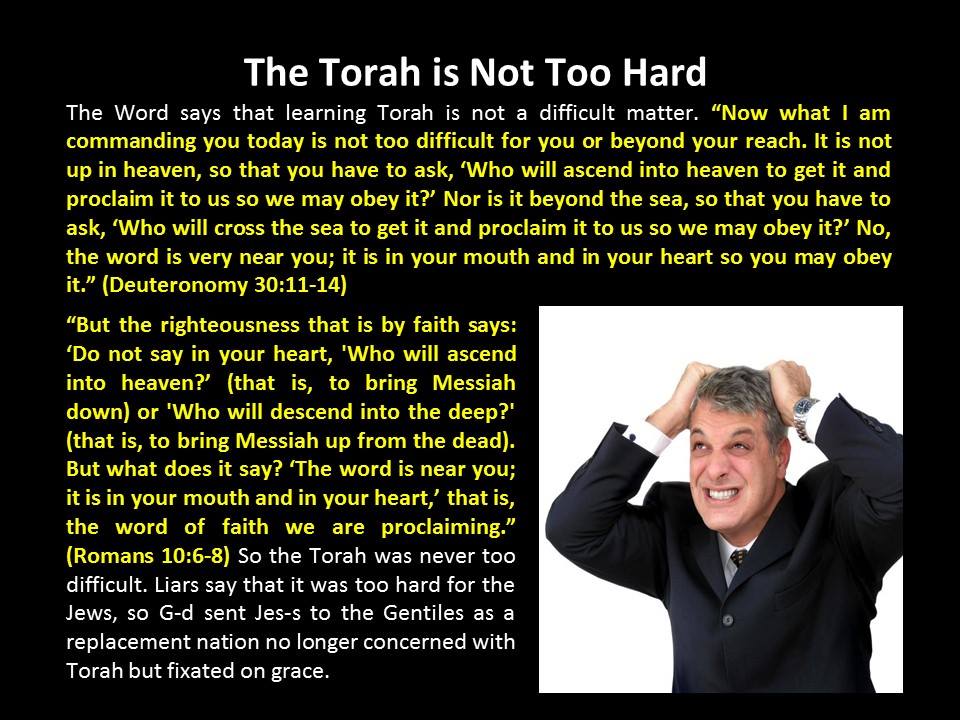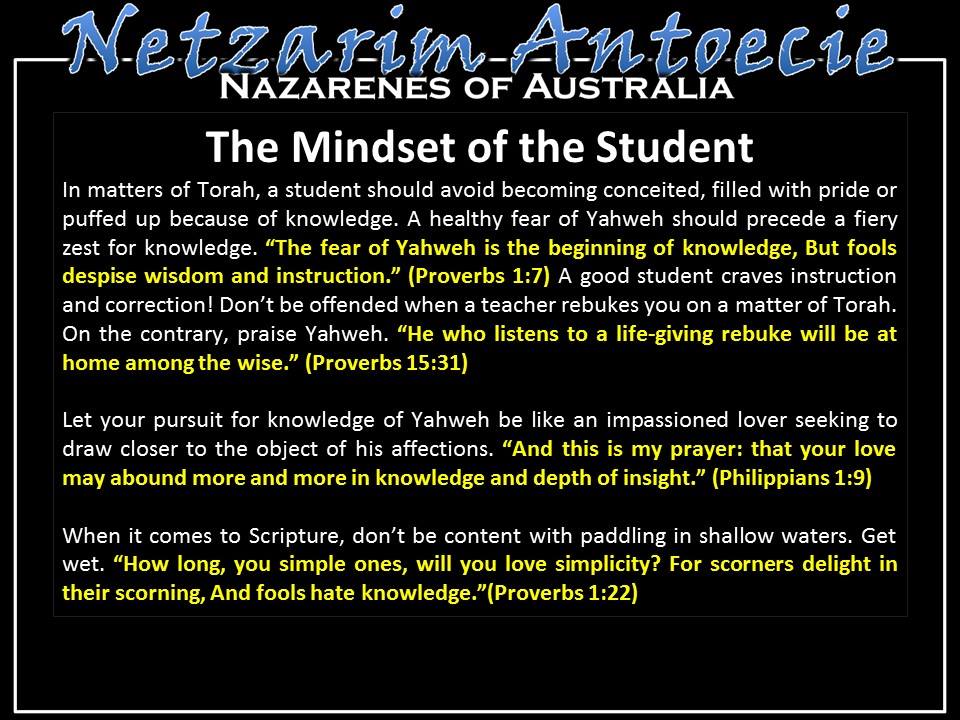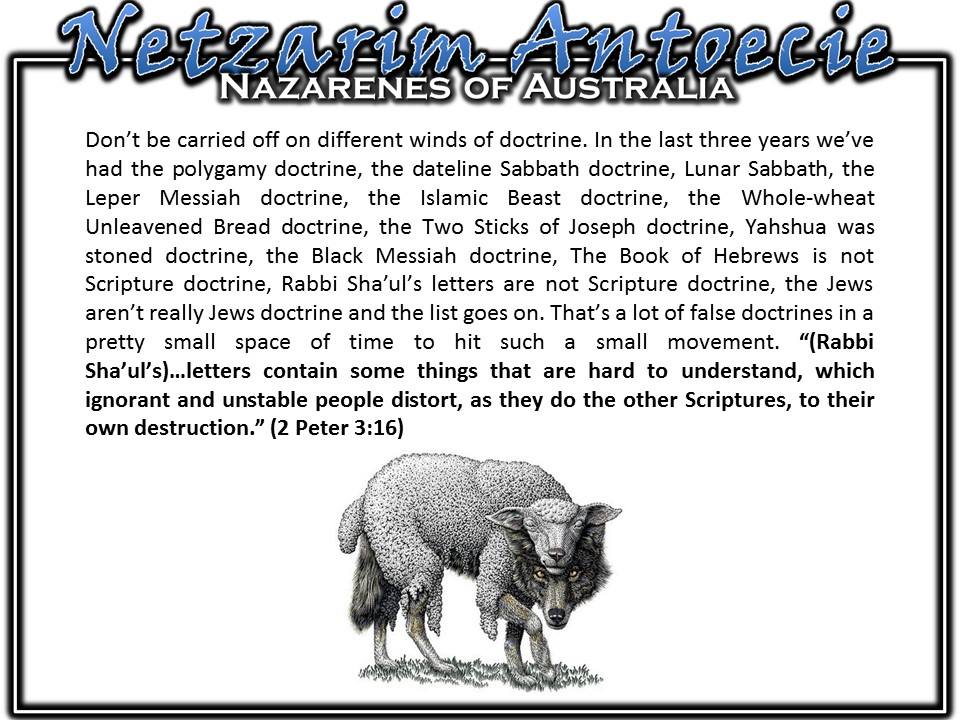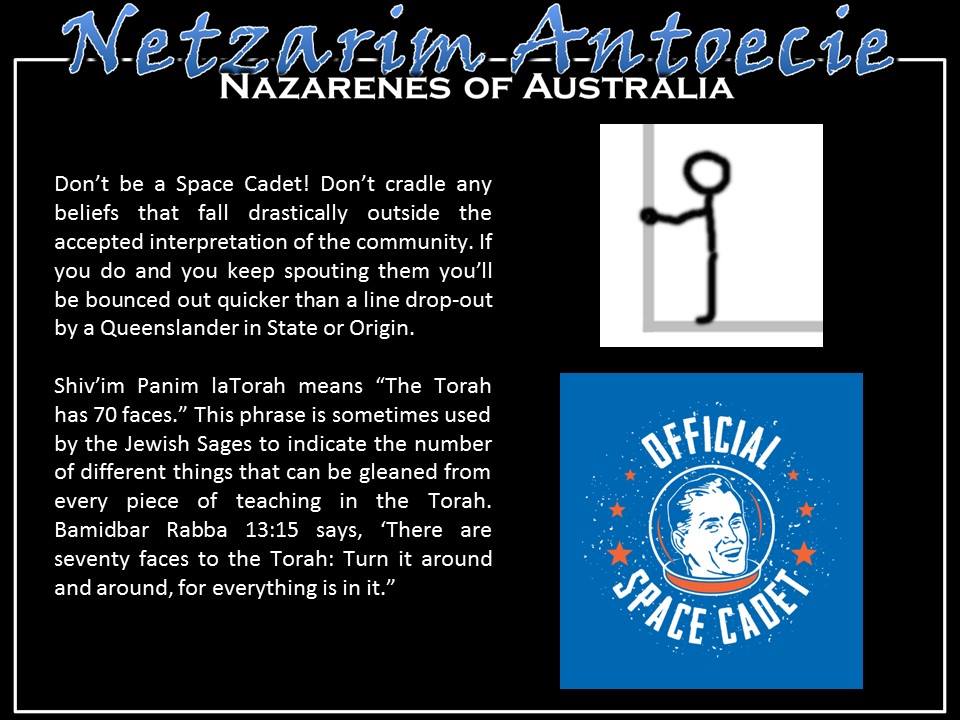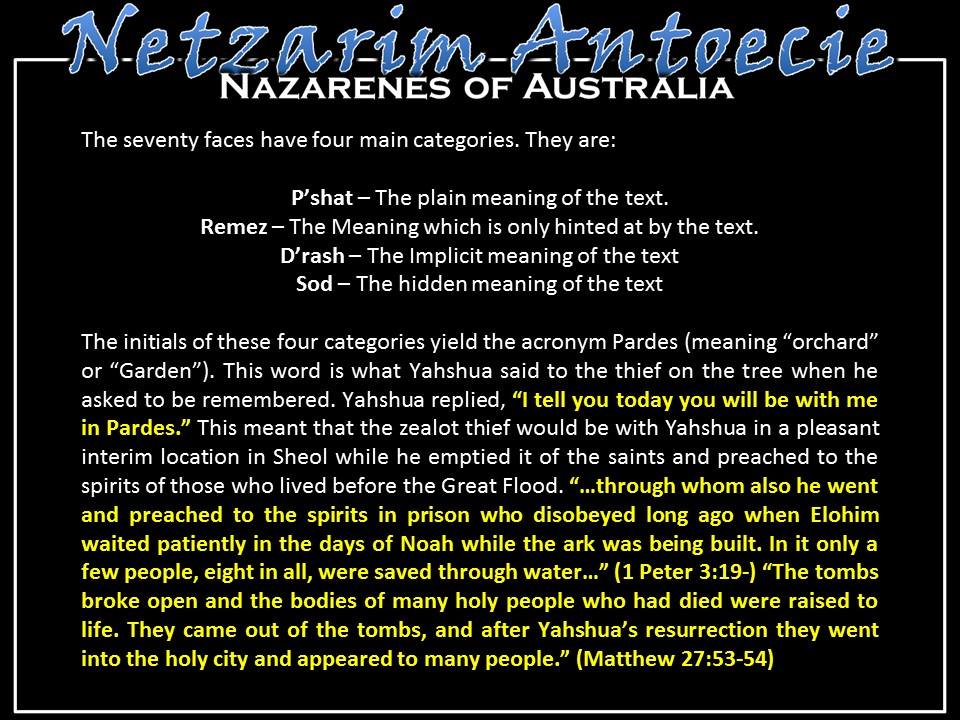Video Teaching
Audio Download
Study Notes and Slides
The Obligations of the Student
Part 2 – Combating Laziness
Have you ever wondered why the Bible is so misunderstood?
(Slide) Because people don’t really study it. Why don’t most people really study it? Because they usually study their canned religious view of it, laying false foundation after false foundation.
(Slide) The way one studies the exquisite beauty of a gemstone and the way one studies for a school test are often two totally different things. When one studies for an exam a pass of over 50% is usually the goal and when one studies a gemstone, he searches for everything in it.
(Slide) The enemy (Sitre Ahura) works towards man’s miscomprehension of the Almighty’s will.
(Slide) King Messiah Yahshua said, "Do not think that I have come to abolish the Torah or the Prophets; I have not come to abolish them but to fulfil them.” (Matthew 5:17) Our King and Saviour did not come to cancel the Torah, but to fulfil the prophetic Messianic appointments outlined in the writings of the Torah and the Prophets. Down to the seemingly most minor ordinance to the most critical decree, Yahweh’s Torah is unchanging. This is echoed in the morning prayers instituted by the Men of the Great Assembly where it reads, “Elohim will never amend of exchange his Torah.” Messiah Yahshua declared that Heaven and Earth would be destroyed before the smallest letter or even one accent marking of the Torah were removed. “I tell you the truth, until heaven and earth disappear, not the smallest letter, not the least stroke of a pen, will by any means disappear from the Torah until everything is accomplished. Anyone who breaks one of the least of these commandments and teaches others to do the same will be called least in the kingdom of heaven, but whoever practices and teaches these commands will be called great in the kingdom of heaven.” (Matthew 5:18-19)
(Slide) The Word says that learning Torah is not a difficult matter. “Now what I am commanding you today is not too difficult for you or beyond your reach. It is not up in heaven, so that you have to ask, ‘Who will ascend into heaven to get it and proclaim it to us so we may obey it?’ Nor is it beyond the sea, so that you have to ask, ‘Who will cross the sea to get it and proclaim it to us so we may obey it?’ No, the word is very near you; it is in your mouth and in your heart so you may obey it.” (Deuteronomy 30:11-14)
“But the righteousness that is by faith says: ‘Do not say in your heart, 'Who will ascend into heaven?’ (that is, to bring Messiah down) or 'Who will descend into the deep?' (that is, to bring Messiah up from the dead). But what does it say? ‘The word is near you; it is in your mouth and in your heart,’ that is, the word of faith we are proclaiming.” (Romans 10:6-8) The Torah was never too difficult. There are those that say the Torah was too difficult for the Jews, so G-d sent Jes-s to the Gentiles to make a replacement nation, no longer concerned with Torah but fixated on grace. This is not true!
(Slide) In matters of Torah, a student should avoid becoming conceited, filled with pride or puffed up because of knowledge. A healthy fear of Yahweh should precede a fiery zest for knowledge. “The fear of Yahweh is the beginning of knowledge, But fools despise wisdom and instruction.” (Proverbs 1:7) A good student craves instruction and correction! Don’t be offended when a teacher rebukes you on a matter of Torah. On the contrary, praise Yahweh. “He who listens to a life-giving rebuke will be at home among the wise.” (Proverbs 15:31)
Let your pursuit for knowledge of Yahweh be like an impassioned lover seeking to draw closer to the object of his affections. “And this is my prayer: that your love may abound more and more in knowledge and depth of insight.” (Philippians 1:9)
When it comes to Scripture, don’t be content with paddling in shallow waters. Get wet and yearn to go into the depths. “How long, you simple ones, will you love simplicity? For scorners delight in their scorning, And fools hate knowledge.” (Proverbs 1:22)
(Slide) Always keep in mind that acquiring knowledge of Yahweh will improve your relationship with Him. “For I bear them witness that they have a zeal for Elohim, but not according to knowledge.” (Romans 10:2)
Find out about who you’re worshiping. “You Samaritans worship what you don’t know; we worship what we do know, for salvation is from the Jews.” (John 4:22)
Petition Yahweh daily with requests to increase in understanding. “…keep asking that the Elohim of our adon Yahshua HaMoshiach, the glorious Father, may give you the Spirit of wisdom and revelation, so that you may know him better.” (Ephesians 1:17)
(Slide) Don’t be carried off on different winds of doctrine. In the last seven years we’ve had the polygamy doctrine, the dateline Sabbath doctrine, Lunar Sabbath, the Leper Messiah doctrine, the Islamic Beast doctrine, the Whole-wheat Unleavened Bread doctrine, the Two Sticks of Joseph doctrine, Yahshua was stoned doctrine, the Black Messiah doctrine, The Book of Hebrews is not Scripture doctrine, Rabbi Sha’ul’s letters are not Scripture doctrine, the Jews aren’t really Jews doctrine and even the flat earth theory some how ended up on our ledger. That’s a lot of false doctrines in a pretty small space of time to hit such a small movement. “(Rabbi Sha’ul’s)…letters contain some things that are hard to understand, which ignorant and unstable people distort, as they do the other Scriptures, to their own destruction.” (2 Peter 3:16)
(Slide) Don’t be a Space Cadet! You don’t have to cradle beliefs or opinions. You can stick to what Elohim says. Every conceivable subject is broadly covered in Scripture. Good Rabbinic writings and some good Christian commentary simply refine Scripture to assist with applying it to life matters.
Shiv’im Panim laTorah means “The Torah has 70 faces.” This phrase is sometimes used by the Jewish Sages to indicate the number of different things that can be gleaned from every piece of teaching in the Torah. Bamidbar Rabba 13:15 says, ‘There are seventy faces to the Torah: Turn it around and around, for everything is in it.”
(Slide) The seventy faces have four main categories. They are:
P’shat – The plain meaning of the text.
Remez – The Meaning which is only hinted at by the text.
D’rash – The Implicit meaning of the text
Sod – The hidden meaning of the text
The initials of these four categories yield the acronym Pardes (meaning “orchard” or “Garden”). This word is what Yahshua said to the thief on the tree when he asked to be remembered. Yahshua replied, “I tell you today you will be with me in Pardes.” This meant that the zealot thief would be with Yahshua in a pleasant interim location in Sheol while he emptied it of the saints and preached to the spirits of those who lived before the Great Flood. “…through whom also he went and preached to the spirits in prison who disobeyed long ago when Elohim waited patiently in the days of Noah while the ark was being built. In it only a few people, eight in all, were saved through water…” (1 Peter 3:19-) “The tombs broke open and the bodies of many holy people who had died were raised to life. They came out of the tombs, and after Yahshua’s resurrection they went into the holy city and appeared to many people.” (Matthew 27:53-54)
(Slide) Within the Netzarim community there is a great need for sufficient training in matters of Torah as it pertains to daily living. Teachings, discussions and debates on deeper matters of Torah are too frequently appearing from the same who clearly lack knowledge of basic Torah observance. “Of these things put them in remembrance, charging them before Yahweh that they strive not about words to no profit, but to the subverting of the hearers. Study to show yourself approved to Yahweh, a workman that needs not to be ashamed, rightly dividing the Word of Truth. But shun profane and vain babblings: for they will increase to more ungodliness. “(2 Timothy 2:14-16) The purpose of every Torah teaching is to dislodge barriers around the heart to allow Torah to penetrate it. The Torah is already in the mind, albeit dormant in many, but it is the heart that remains the most challenging organ. Once it takes root in the heart the Divine Service begins to be embarked upon, which truly binds the soul to Elohim.
(Slide) The word study in Hebrew is Lamad. It means ‘to learn’ or ‘to teach’ or ‘to study’ or ‘to train.’
(Slide) Lamed represents the diligent learner, someone who allows knowledge to steer the heart rather than let it be swept along by unbridled emotion.
(Slide) The late Rabbi Kalonymus Kalman Shapira, of blessed memory, “…had an instinctive understanding of what was profound and what was superficial in spiritual life, what was valuable and essential and what was of secondary importance.” So says the forward to his book, A Student’s Obligations – Advice from the Rebbe of the Warsaw Ghetto. Rabbi Shapira went on to sanctify Yahweh’s name in a Nazi Death camp at age 55, but during his life he stayed devoted to his calling in educating children and young men in Torah.
(Slide) Rabbi Shapira goes straight for the jugular when addressing some of the foundational issues related to good Torah study and obedience. In his book, A Student’s Obligation he writes, “Laziness is the most common and the most destructive of the ailments of character that afflict young people. Laziness is different to each person. There is a kind of laziness so severe that the person afflicted by it loves to sleep as much as possible, enjoys inactivity, and experiences any form of work as a burden. He is always filled with excuses and justifies himself constantly, as Scripture relates in Proverbs 26:13; “The lazy man says: ‘There is a lion in the way, yes, a lion is on the streets.’” At the same time, he denigrates anyone whose achievements are greater than his own, in order to protect himself from feelings of shame and jealousy of anyone else’s accomplishments”
(Slide) “Go to the ant, you lazybones! Consider its ways, and be wise. It has no chief, overseer or ruler; Yet it provides its food in summer and gathers its supplies at harvest time. Lazybones! How long will you lie in bed? When will you get up from your sleep? “I’ll just lie here a bit, rest a little longer, just fold my hands for a little more sleep” – and poverty comes marching in on you, scarcity hits you like an invading soldier.” (Proverbs 6:6-11)
Rabbi Shapira continues, “At times (one who is lazy) may gain the strength to work hard at his studies for the first week or two of each semester, but his determination quickly peters out. If you possess this character trait, you must quickly attempt to eradicate it at its very root. It is a ruinous trait, potentially destructive to one’s eternal life…The amount of labour necessary to acquire an object should be equal to the value of that which is being obtained. Objects that have little worth may be acquired without much labour, while one must work hard in order to obtain something very precious.”
“If you have compassion on yourself and wish to establish a foundation within you that will serve you well until you reach the wisdom of old age and beyond, excise the trait of laziness from yourself and search and destroy its hidden remnants: the negative attitude toward work that causes negligence and half-heartedness. Become diligent and efficient in your work, but do not become speedy. For the most part, people who work very quickly do a second-rate job…”
(Slide) Rabbi Shapira’s work goes onto to list the principle ills of the soul and their cures. He even provides an exclusive chapter on a cure for laziness and a supplementary chapter called ‘Specific Advice for the Lazy.’ As such this work, though being an Orthodox Jewish publication, is a must have for every Netzarim. The idea is that we get less arguing and debating over meaningless things and more studying and learning.
Another layer of assistance in this area is the wealth of knowledge contained in the Sefer Shemirath ha-Lashon (Guard Your Tongue) by Rabbi Yisroel Meir Kagan, who was generally known as Chofetz Chayim (Desirer of Life). The work itself is about the commandments relating to correct speech and the prohibitions of slander. The title of the work is taken from Psalm 34:12–15; "Come, children, listen to me; I will teach you the fear of Elohim. Who is the man that desires life; who loves days, that he may see goodness [during them]? Guard your tongue from evil, and your lips from speaking deceit; turn from evil and do good, seek peace and pursue it."
How should I Study the Bible?
(Slide) Even with his myriad of human faults and frailties, King David was called 'a man after Yahweh's own heart.' Why? What special quality did this shepherd have that earned him this description? I believe the answer is found in this verse. "Open thou mine eyes, that I may behold wondrous things out of thy Torah. (Psalm 119:118)"
For generations the Jew has never felt alone as long as he held a Tehillim in his hands - a faithful companion and unerring guide, giving voice to prayer, comfort in misfortune, faith in adversity, and light in the darkness. The familiar phrases of Tehillim flow constantly from Jewish lips at all times, in all seasons.” So says the introduction to this two-volume edition of the Book of Psalms, which will change the way you view your life. There should be no distinction between a returning Israelite’s connection with this work anymore than with a Jew. Reading Psalms fulfills Isaiah 43:21 which says, “This nation I created for Myself, to recount My praises.”
(Slide) David haMelech treasured the Torah more than any other possession. He loved and thought about it day and night. Read Psalm 119 for proof of this amazing fact. David constantly prayed to understand Yahweh's Torah: to plumb the depths of each command. Remember what Rabbi Shimon Kepha wrote in 2 Peter 1:20-21, that both the prophecy and the understanding of prophecy come from Yahweh. In other words, we can no more understand a divine prophecy than we can deliver one. Both the prophecy and the understanding must come from above. So pray for understanding like King David did. It will be given you in response to your true reaction to Yahweh's Torah. You will either see or you will not see.
(Slide) You will either understand, or the message will pass you by even were it thundered in your ears a thousand times. The study of Yahweh's Word, and in particular the study of His Torah, will make you humble, wise, happy and content. You too could become a man or woman after Yahweh's own heart. He will react to your innermost yearnings just as He did to King David's. He will open your eyes to see wondrous things out of His Torah. But more importantly, He will grant you the fruits of true understanding: obedience, peace, happiness and joy in your own soul.
(Slide) The Torah is a great treasure, a wealth far beyond anything else that can be gained in the whole world. The ordinances of Yahweh are sure and altogether righteous. They are more precious than gold, than much pure gold; they are sweeter than honey, than honey from the comb.” (Psalm 19:9-10)
(Slide) But, hang on just one sec Cowboy!
(Slide) This means that we must not read the Holy Scriptures with the sole intention of proving others wrong: if you read the Holy Scriptures with the wrong motive, it will not benefit you one iota. Most, if not all, your studies will be a waste of time. You will certainly fill your mind with facts; which you could use to bash others over the head and show them how much Scripture you know: but as far as your eternal salvation is concerned, that will profit you nothing! You'll be wasting your time.
(Slide) “Your words were found, and I ate them, and Your word was to me the joy and rejoicing of my heart; for I am called by Your name, O Sovereign Yahweh Tz’veout. (Jeremiah 15:16)”
Oh the difference between finding something and eating it. It is the one that eats that gets the benefit of what he has found. Eating makes digestion and assimilation possible. When these functions are normal, the result is health and strength that aid us in all usefulness and joy of living. Your well-being depends on your nourishment and the best nourishment man can consume is the Word of Yahweh. “…desire the sincere milk of the word, that ye may grow thereby.” (1 Peter 2:2) The more of this food you can consume the better, provided you can digest and assimilate.
(Slide) Holding the Word of Yahweh in your mind is like holding food in your mouth. This is how we get the full taste of it. Mixing the Word with meditation as one mixes his food with his saliva causing the food to erupt with flavor. “How sweet are Your words to my taste, sweeter than honey to my mouth!” (Psalms 119:103)
(Slide) As you hold the Word of Yahweh in your mind, a wonderful thing begins to happen, Yahweh begins to write it on your heart. Doing this causes the Word to taste sweet to you.
Quite literally, the Torah interprets all Scripture. Obscure, symbolic passages in one of its books are explained elsewhere in simple terms. As with all good instructional literature, the Holy Scripture is packed with illustrations and examples. In the first five books of the Torah we find all the laws Yahweh gave mankind through His servant Moses. Then there follows book after book of examples of how Yahweh reacts to His people's behavior regarding those laws.
It's all there: the commands in the Torah, the prophetic warnings and living examples of how Yahweh reacts in the other books. You will not find many ethical decisions you have to face in life which are not dealt with in the Holy Scriptures: because Yahweh has not only told us how He wants us to live, but He has also included examples in His word of what will happen if we do not. It is folly of the worst kind to imagine that one can ignore the directions and commands of Yahweh and get away with it.
“Grace and peace be multiplied to you in the knowledge of Yahweh and of YahShua our King, as His divine power has given to us all things that pertain to life and godliness, through the knowledge of Him who called us by glory and virtue, by which have been given to us exceedingly great and precious promises, that through these you may be partakers of the divine nature, having escaped the corruption that is in the world through lust. (2 Peter 1:2-4)”
Study, So That You Are Not Ashamed!
(Slide) Believers spend hours arguing about doctrine. Many make the mistake of trying to find texts, which support what they think, is the truth. They conceive an idea and then spend hours trying to find texts to support it. Instead, we should study all the texts we can find on a given subject before deciding what to believe. Invest in a Bible Concordance: it will enable you to study many texts on a given subject. If time allows, look up as many texts as you can. Then, after prayerfully studying them, see what the Spirit is saying in the Scriptures on that subject. It is Yahweh's Word: and it has a great deal to teach you. The Holy Scriptures are Yahweh lamp to guide our steps: read it every day. In critical matters, that is, in those areas where a mistaken opinion could result in sin, be extra careful and tread softly. Don't delude yourself into excusing your own sins: because on the Day of Judgement - and possibly even earlier - you'll regret it.
(Slide) Most Scriptural truths are portrayed on two levels.
The Physical: This is the first level we humans can see and easily understand. It involves literal, physical things like nations, landmasses, trees, animals, fish, individuals and their possessions.
The Spiritual: This higher level contains the real lessons Yahweh is eager to teach us. It involves concepts, principles, motives, thoughts and all the other activities, which go to make up human character. To explain lessons on this level the Master often used parables, which are stories, based on first level physical examples. By using a level one object lesson, a visual aid, the Saviour high-level truths which are normally not grasped by the human mind. “Now all these things happened unto them for ensamples: and they are written for our admonition, upon whom the ends of the world have come. (1 Corinthians 10:11)"
This means that most, if not all, the experiences recorded in the Holy Scriptures have a wider, higher, spiritual application. They occurred in those ancient days on one level; but were recorded 'for our admonition' for our learning! Because they are 'real-life prophecies' of earth-encompassing realities scheduled to take place on a massive scale in our day - upon which the ends of the world have come.
(Slide) Nothing exercises the mind more than writing down what you have learned. It is for this reason that is why I try to have the notes in front of you as I preach or teach so that you can write down the questions and scriptural answers. Try to get into the habit of writing down what you have learned. Make notes in the margins of your Scriptures. Underline passages that impress you as being important. Set up your own reference system, which will point you to a preceding or succeeding text, which deals with the same subject. Do not be scared of ruining the pages: because when you write something down on paper, you are in fact writing it on your mind. Keep a Notebook and write down the things you have learned. If you have a computer, so much the better; because you will then be able to update your work regularly.
What the Word can do
(Slide) The Scripture will make one wise unto salvation.
“…from childhood you have known the Holy Scriptures, which are able to make you wise for salvation through faith which is in Messiah YahShua (2 Timothy 3:15)”
The Scripture will produce the Gift of Faith.
“…faith comes by hearing, and hearing by the word of Yahweh. (Romans 10:17)”
The Scripture will reveal who the Messiah Is.
“You search the Scriptures, for in them you think you have eternal life; and these are they which testify of Me. (John 5:39)”
The Scripture will build up your resolve.
“…I commend you to Yahweh and to the word of His grace, which is able to build you up … (Acts 20:32)”
The Scripture will notify you of your inheritance.
“…I commend you to Yahweh and to the word of His grace, which is able to … give you an inheritance among all those who are sanctified. (Acts 20:32)”
(Slide) “And he said, Go thy way, Daniel: for the words are closed up and sealed till the time of the end. Many shall be purified, and made white, and tried: but the wicked shall do wickedly: and none of the wicked shall understand; but the wise shall understand.” (Daniel 12:9,10)
What is this text saying? It is saying that understanding will not be given to the wicked, 'none of the wicked shall understand:' but understanding is given to the righteous, to those who have been purified, made white and tried. In other words, true understanding is not a matter of human intellect, education, will power or finance. True wisdom and understanding are gifts from Yahweh to those who do His will.
The sincere desire to know and obey Yahweh's Torah is the very first step towards true wisdom and understanding. Conversely, the path of wickedness leads inevitably to ignorance, confusion and folly. “But the path of the just is a shining light, that shineth more and more unto the perfect day. (Proverbs 4:18)”
This means that if you really want to know, you must Trust and Obey Yahweh: and as you do this your path will become brighter and brighter as time proceeds. You will learn more and more, not only about human nature and its follies, but of Yahweh's plans, His methods and His aims and, perhaps, His motives. For you, life will not become a confused mess, as it is with so many people, but a glorious journey with Yahweh guiding your every step.



























































